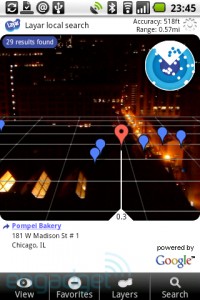Announcing Digital Studies / Le champ numérique. This is a new journal from the SDH/SEMI (Society for Digital Humanities).
Wapedia – Wiki: Stewart Butterfield
Apparently Stewart Butterfield, one of the co-founders of Flickr was a philosophy major. He got his BA in philosophy from the University of Victoria and an MA from Cambridge. Did philosophy make a difference? Hard to tell, but he gives a talk on How to Make a Fortune with your Liberal Arts Degree according to the Lavin Agency that represents him. The site quotes him to the effect, “You can always pick up how to figure out profit and loss, but it’s harder to pick up the other stuff on the fly.”
His co-founder and partner Caterina Fake, now working on Hunch, studied English and has a thoughtful blog here.
Just goes to show how useful the humanities are.
Philip Roth predicts novel will be minority cult
The Guardian online has a story about how novelist Philip Roth predicts novel will be minority cult. According to the story by Alison Flood (Monday 26th of October, 2009),
He said it was “the print that’s the problem, it’s the book, the object itself”. “To read a novel requires a certain amount of concentration, focus, devotion to the reading. If you read a novel in more than two weeks you don’t read the novel really. So I think that kind of concentration and focus and attentiveness is hard to come by – it’s hard to find huge numbers of people, large numbers of people, significant numbers of people, who have those qualities,” he said.
I wonder if it true that screens take less concentration than books. I can believe it about television, but not about doing things on the screen like programming or even playing a console game. I can finish most books much faster and with less hard work than playing a console game (which may say something about my gaming skills.) Is it really the form of the object (screen vs book) or the content (typical TV show vs difficult novel)?
15 Augmented Reality Apps for iPhone

Technically Personal posted a very useful list of 15 Stunning Augmented Reality Apps for the iPhone. This includes Layar which is now available for the iPhone (see image above.) These AR apps make it possible to start developing AR games.
Thanks to Sean for this.
Workshop On Application Programming Interfaces For The Digital Humanities
This weekend I was at a workshop on Application Programming Interfaces for the Digital Humanities. See the philosophi.ca wiki conference report.
The workshop looked at the possibilities and issues around APIs for digital humanities resources. I think it is fair to say that lots of projects have been exposing APIs but they aren’t being used much. We need to encourage projects to develop mashups that take advantage of the APIs.
This workshop, more than any other I’ve been at was heavily twittered (#apiworkshop) which was interesting and annoying. At times people seemed to space out and not participate as they rushed to document what was happening or contribute some bon mot. I should admit that I am part of the problem – I posted a few and was writing my conference report live which was just as distracting. I guess we all have develop an etiquette for situations where you are not just part of an audience, but are expected to participate.
Flickr pool: “O-Matic” Mania
 I received an invitation to add a photo of a “TRAFF-O-MATIC” detector cover to a Flick pool about O-Matic Mania. Looking at the pool of photos begs the question where “o-matic” as a suffix came from.
I received an invitation to add a photo of a “TRAFF-O-MATIC” detector cover to a Flick pool about O-Matic Mania. Looking at the pool of photos begs the question where “o-matic” as a suffix came from.
Bibliothèque Nationale – a set on Flickr

A couple of weeks ago I went to Paris for a meeting and was able to visit the new (see my Flickr set on the Bibliothèque Nationale). It is hard to tell from one short visit how it is as a library, but it is a stunning building to walk around. It spoke to me of exclusion – a cave (or inferno) of knowledge that you get progressive access to. The deepest levels are reserved for the true scholars (not tourists like me.)
Peking/York Symposium
This week I was at the Peking/York Symposium organized by the Faculty of Arts at York University. See my conference notes are at philosophi.ca : York Symposium. The symposium focused mostly on the development of new media programmes and research in arts in the comprehensive university. There were representatives from major Canadian universities with art faculties and two Chinese universities. The challenges in a comprehensive university include how to work with other disciplines like computer science and engineering as computing is woven in. The arts have issues very similar to humanities computing – issues of labs, recruiting faculty, maintaining infrastructure, developing interdisciplinary programmes and fostering interdisciplinary research. While it is easy to call for interdisciplinarity it is harder to develop real structures that support appropriate clusters.
Mihajlo Idvorski Pupin – Wikipedia, the free encyclopedia
Thanks to Willard, I’m reading Mihajlo Idvorski Pupin’s Romance of the Machine, a defense of American materialism, science and engineering. He identifies 3 sets of technologies that have consolidated the Union – the telephone, the vacuum-tube oscillator (radio), and the gas-engine (auto and airplane.) He weaves a consciously idealistic story about engineering mirroring the machines of nature and weaving peace.
The machine is the visible evidence of the close union between man and the spirit of the eternal truth which guides the subtle hand of nature. (p. 29)
It looks like an act of providence that the telephone was born when the consolidation of our Union needed it most; the vacuum-tube oscillator arrived in time to lend its aid in the consolidation of this nation with the other nations of the world. Many an enthusiast believes that these two machines are messengers sent from heaven to aid in the guidance of the destiny of this nation, and of the whole world. This enthusiasm is not surprising. (p. 92)
There is a very interesting chapter (“Romance of the Telephone”, III) where Pupin argues that the telephone provided two important innovations – first the communications network and second a model democratic industry.
There is another epoch-making service which the telephone
rendered to this nation. This service was the creation of a great
American telephone industry, which in many respects serves to-day as a model to other big American industries. (p. 67)
His argument is that ATT is too big to be owned by wealthy families. Instead it is owned by the middle class – people like its employees. He further sees the management as coming from the same middle class and being professionals. He sees a shift from political democracy to economic democracy which benefits all. Whatever happened to that idealism?
Our telephone industry and the other large American industries encourage us in the belief that we are much nearer to the ideal of economic democracy than we are to Lincoln’s ideal of political democracy. The first is developed by scientists and engineers, the second is <pb> in the hands of politicians. (p. 77 – 78)
One thing that happened is a loss of faith in the technocracy. The second thing was a shift in business towards management who saw their mandate narrowly as being only to increase investor value.
Some more quotes:
There will be no place for barbarism, like war, in a world in
which the two American machines, the telephone and the vacuum-tube oscillator, are afforded every opportunity to develop their latent powers for the enlightenment of the world.Here are two.machines which the American machine civilization has produced, and thus laid the foundation of the radio art, the most subtle and refined of all the technical arts ever conceived by the human mind. No trace of materialism can be detected in their history. On the contrary, their achievements represent them as messengers from heaven sent to earth to rid the world of barbarous notions and raise it to a higher level of civilization.(p. 94)
The telephone, the telegraph, the vacuum-tube oscillator, the aeroplane, and the automobile, will certainly bring the peoples of the world closer to each other and establish between them bonds of friendship, just as they are establishing them between the peoples of our States. That is the highest mission of these machines. (p. 103)
The book ends by talking about “The Great American Experiment” and how this political experiment inspired engineers and scientists to develop technologies to consolidate the Union so that “The designers, the builders, and the machines employed by them are the inseparable parts of the American machine civilization.” (p. 111)
Bibliographic Reference: Michael Pupin, Romance of the Machine (New York: Charles Scribner’s Sons, 1930).
Peter Nicholson: The Changing Nature of Intellectual Authority.doc – Powered by Google Docs
Peter Nicholson of the Council of Canadian Academies has an interesting paper that he has given on The Changing Nature of Intellectual Authority. His thesis is:
People today are much less prepared to defer to the experts. But at the same time, we are being swamped with data and information – a glut that cries out for analysis and summary. So there’s a dilemma. Who to turn to? Increasingly the answer is – Well, to ourselves of course, as individuals empowered by a world wide web that has rapidly evolved into a social medium. More specifically, it is a medium that today supports massively distributed collaboration on a global scale that – we can only hope – will help us make sense of it all.
He talks about the “decline of deference” to traditional authorities (from the church to academic experts) and talks about it taking place recently. I suspect its been happening since the enlightenment began and might be a general feature of modernity and improved communication (and democratic institutions.) What is new is the ability of the many to replace authority with a distributed or networked authority. People now believe things are true if they have been negotiated by a community. Something is true enough if it won’t get you in trouble because your crowd has authorized the truth. Most of the time such negotiated truth is fine (with enough eyeballs someone will point out a flaw), but other times the community misses something and is satisfied with not-quite-good-enough.
